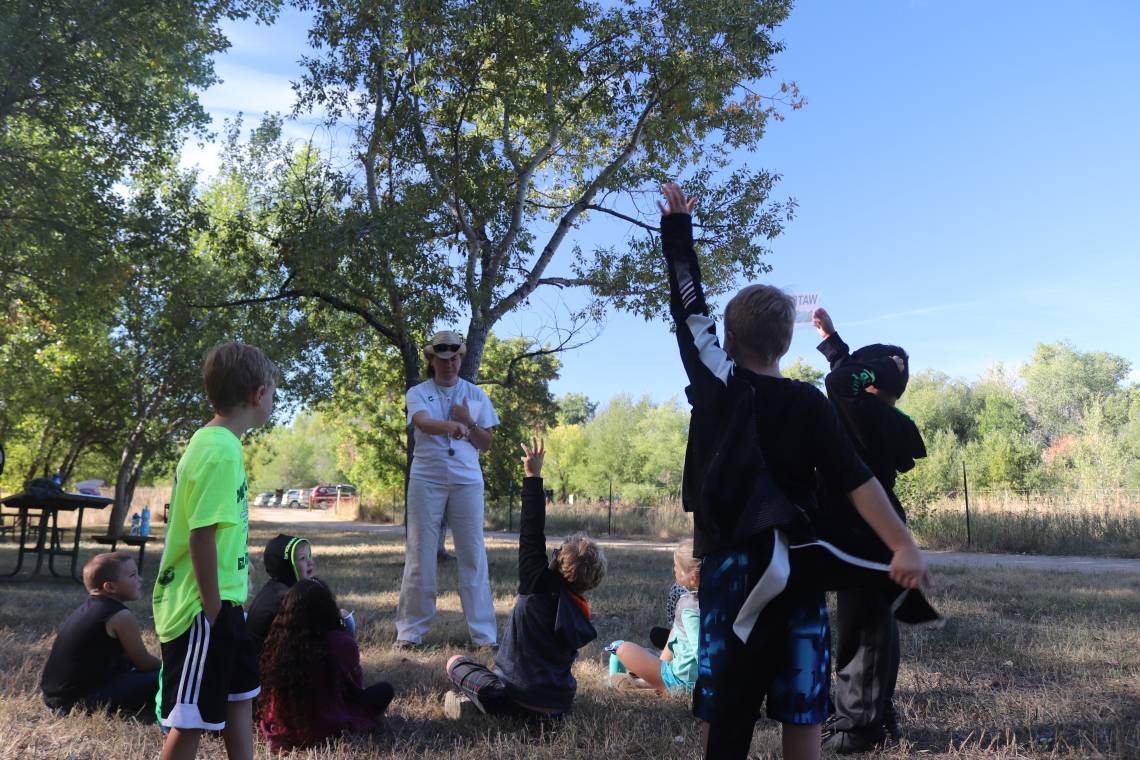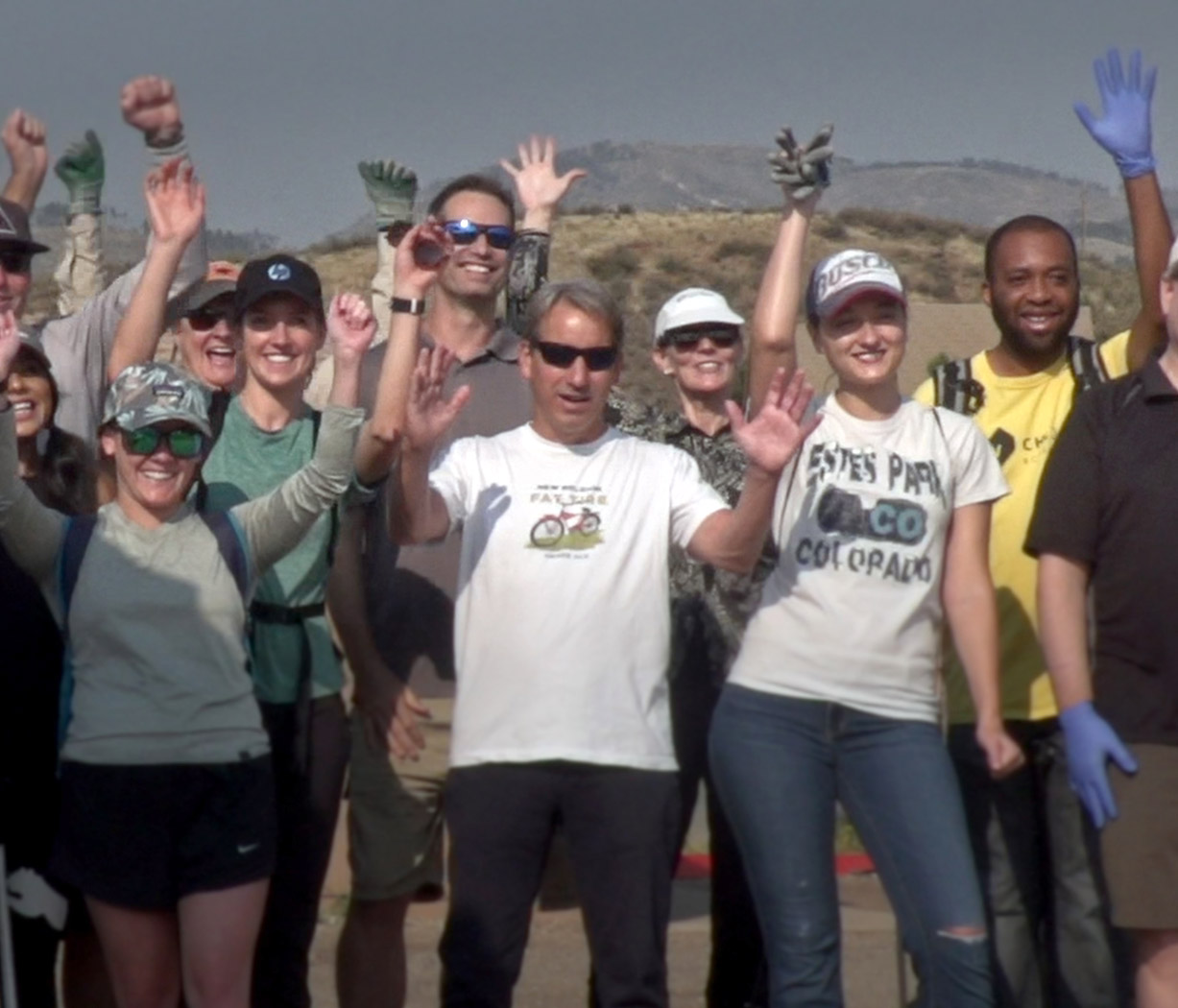Let us connect your students to nature, people, and place. We provide guided educational field trips to enhance what students are learning in the classroom.
Using nature as the classroom can be a fun, engaging way to connect your students to the curriculum.

Larimer County open spaces are special places to discover science. We offer life and earth science programs that are hands-on, interactive, support Colorado state science standards and inspire stewardship of our natural resources.
Our volunteer and staff are ready to take your students on a journey of discovery. Choose from one of our field trips below to get your students exploring the wonders of the world.
Spring registration is open.
Rocks are the clues to the mystery of the Earth's past.
4 Station Field Trip
- Location: Devil's Backbone Open Space
- Time: 2-3 hours
- Distance: < 1 mile
- Second, Fourth and Sixth Grade
Students will learn about:
- Local geological topography.
- Processes involved in changes in the Earth's surface over time.
- The three rock types and how they are formed and changed.
- How plants, animals, and humans can change the physical characteristics of their environment.
- How humans can be stewards of the land and make decisions that impact the Earth.
State Standards
- Second Grade
- Physical Science
- 1.1 Matter exists as different substances that have observable different properties.
- Life Science
- 2.1 Plants depend on water and light to grow and on animals for pollination or to move their seeds around.
- 2.2 A range of different organisms live in different places.
- Earth and Space Science
- 3.1 Some events on Earth occur quickly; others can occur very slowly.
- 3.2 Wind and water can change the shape of the land.
- Fourth Grade
- Earth and Space Science
- 3.1 Earth has changed over time.
- 3.2 Four major earth systems interact.
- 3.4 Energy and fuels that humans use are derived from natural sources and their use affects the environment in multiple ways.
- Sixth Grade
- Physical Science
- 1.1 The fact that matter is composed of atoms and molecules can be used to explain the properties of substances, diversity of materials, states of matter and phases changes.
- Life Science
- 2.5 Organisms and populations of organisms are dependent on their environment interactions both with other living things and non-living factors.
- Earth and Space Science
- 3.3 Rock strata and fossil records can be used as evidence to organize the relative occurrence of major historical events in Earth's history.
- 3.4 Energy flows and matter cycles within and among Earth's systems, including the sun and Earth's interior as primary energy sources. Plate tectonics is one result of these processes.
- 3.5 Plate tectonics is the unifying theory that explains movements of rocks at Earth's surface and geological history.
- 3.6 Water cycles among land, ocean, and atmosphere, and is propelled by sunlight and gravity. Density variations of sea water drive interconnected ocean currents. Water movement causes weathering and erosion, changing landscape features.
- 3.8 Humans depend on Earth's land, ocean, atmosphere, and biosphere for different resources, many of which are limited or not renewable. Resources are distributed unevenly around the planet as a result of past geologic processes.
- 3.10 Human activities have altered the biosphere, sometimes damaging it, although changes to environments can have different impacts for different living things.
Habitats provide the components living organisms need to survive.
4 Station Field Trip
- Location: Devil's Backbone Open Space or River Bluffs Open Space
- Time: 2-3 hours
- Distance: < 1 mile
- Kindergarten, First Grade, and Second Grade
Students will learn about:
- The factors that make up a habitat.
- How plants and animals rely on habitats.
- What plants need to grow and reproduce.
- How habitats can change over time.
- How their actions can affect the environment.
- Leave No Trace principles.
State Standards
- Kindergarten
- Physical Science
- 1.2 Sunlight affects the Earth's surface.
- Life Science
- 2.1 To live and grow, animals obtain food they need from plants or other animals, and plants need water and light.
- Earth and Space Science
- 3.2 Plants and animals meet their needs in their habitats and impact one another; people can prepare for severe weather.
- First Grade
- Life Science
- 2.1 All organisms have external parts that they use to perform daily functions.
- Second Grade
- Life Science
- 2.1 Plants depend on water and light to grow and rely on animals for pollination or to move their seeds around.
- 2.2 A range of different organisms live in different places.
Learn how climate, weather and people influence natural disasters.
4 Station Field Trip
- Locations: Devil's Backbone Open Space or River Bluffs Open Space
- Time: 2-3 hours
- Distance: < 1 mile
- Third Grade
Students will learn about:
- How natural disasters affect people and ecosystems.
- How natural disasters happen.
- How people can work to reduce the impact of natural disasters by taking care of our ecosystems.
- How people can be stewards of the land and make decisions that impact the Earth.
- Why healthy natural ecosystems are valuable in reducing the impact of natural disasters on people.
State Standards
- Third Grade
- Life Science
- 2.3 Different organisms vary in how they look and function because they have different inherited information; the environment also affects the traits that an organism develops.
- Earth and Space Science
- 3.1 Climate describes patterns of typical weather conditions over different scales and variations; historical weather patterns can be analyzed.
- 3.2 A variety of weather hazards result from natural process; humans cannot eliminate weather-related hazards but can reduce their impacts.
Observation deepens the connection to nature and place.
Guided Hike
- Locations: Horsetooth Mountain Open Space, Devil's Backbone Open Space, other open spaces upon request (may depend on group size)
- Time: 3-4 hours
- Distance: 3+ miles
- Any grade
Students will learn about:
- The plants and wildlife of Larimer County.
- Leave No Trace principles and how people can be stewards of our natural resources.
- How humans have used these lands in the past and present.
- The impacts of wildfire.
- Observation skills through a color scavenger hunt, silent hike or micro hike.
- Life zones, habitats, and connections within an ecosystem.
State Standards
- Earth and Space Science
- Life Science
- Movement Competence and Understanding
- Physical and Personal Wellness
This is an informal program that is designed to take advantage of what we see on the trail. Specific topics may vary. If you have interest in covering a specific topic or standard, let us know. Our Naturalists lead programs on geology, wildlife, plants, local history and more! Write a suggestion in your request form, and we'll do our best to accommodate it.
Education Field Trip Program Guide
FAQs
-
How large of a group can I bring on a field trip?
We welcome groups no larger than about 100 people (students and teachers/chaperones). Groups will be split into 3-4 smaller groups.
If you would like to bring more than 100 people, we can schedule you on two separate days. This works well if you'd like to bring more than one class at a time.
-
How much does a field trip cost?
It's free! There is no cost to schedule a school field trip with us.
-
Is funding available to help with transportation costs?
Yes! Larimer County Department of Natural Resources has funding available to help subsidize transportation to County Open Spaces for school field trips. Funds are limited and applications will be considered on a first come, first served basis. Funding can cover up to $200 of your transportation costs.
Mark it on your request form and we'll send you the application.
-
Are programs offered in Spanish?
Unfortunately, no. However, we are willing work with you to best accommodate second-language learners.
-
May I bring students with special needs?
We welcome youth with special needs to our programs. Please let us know how we can best prepare by including this information in the Special Accommodations section of the request form. We ask that an aide or assistant, who is familiar with the children, accompanies them to the program.
-
Are restrooms available?
Restrooms are available at the trailhead. However, once we are out on trail it may be a short hike to the restroom. We'll provide time before and after the program for your students to utilize the restroom.
-
May we bring lunches along on our field trip?
Yes, please do! We include time for lunch at the end of the program and most locations have picnic tables or a pavilion where your students can eat lunch. Please let us know if we need to include a snack time into the middle of the program.
We recommend all students bring a backpack to carry their lunch and other belongings.
-
Are field trips only for schools?
No. While these field trips are designed to complement curriculum in the classroom, anyone can request a field trip. We'd be happy to lead it for your scout troop, camp, youth group or home school.
If you are interested in a guided educational program but looking for something more informal, or for adults, check out our Special Request Programs.
-
When can I schedule a field trip?
Field trips are available Tuesday - Friday starting at 9:00 or 10:00 am. Typically, we schedule field trips during the Spring & Fall semesters.
-
How far in advance must I sign up?
We require at least two weeks advanced notice; a month in advance is preferred. On the request form, you'll see available dates. Selecting an alternative date provides us with flexibility.
The School Field Trip request form will be available a month before the start of the school semester.
-
How do I sign up?
Submit a School Field Trip request form in Offero. You'll need to create an account; your name, phone number and email are all that is required.
Once we receive your request, we'll be in contact to discuss details and/or confirm the date. If you have questions, contact Ashley Krueger 970-419-4592 akrueger@larimer.org .


